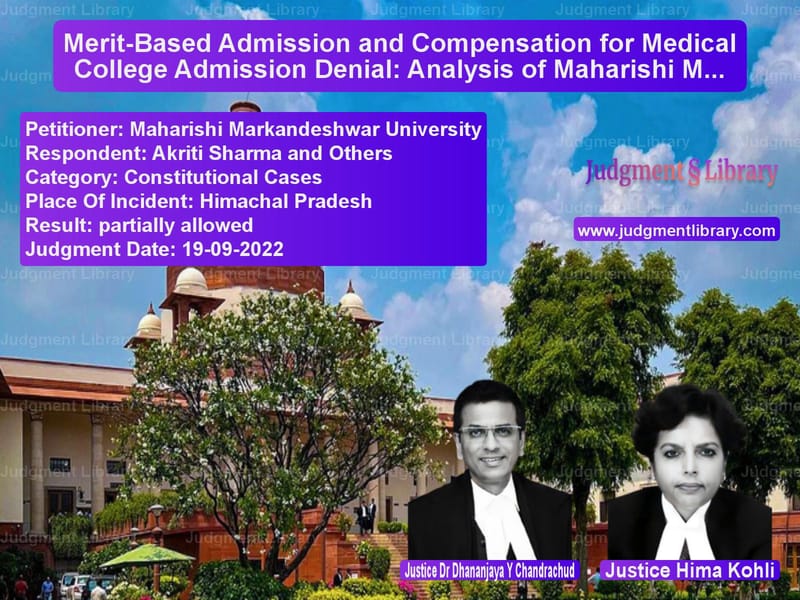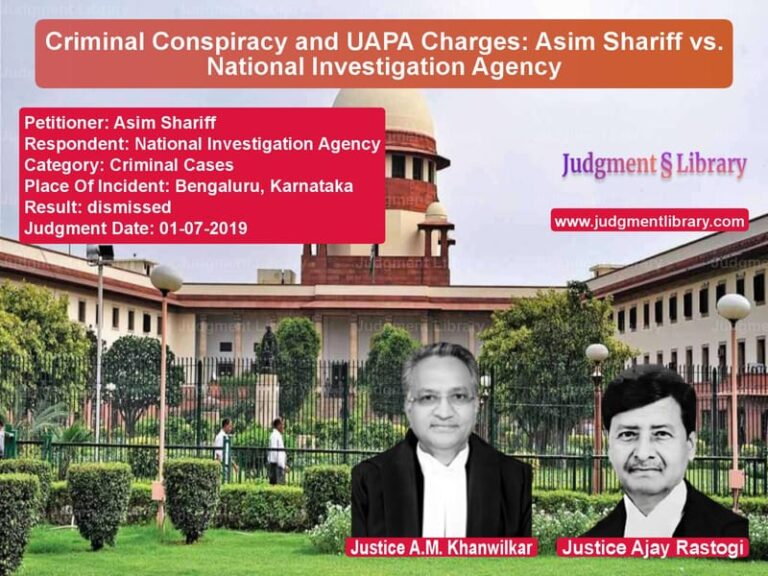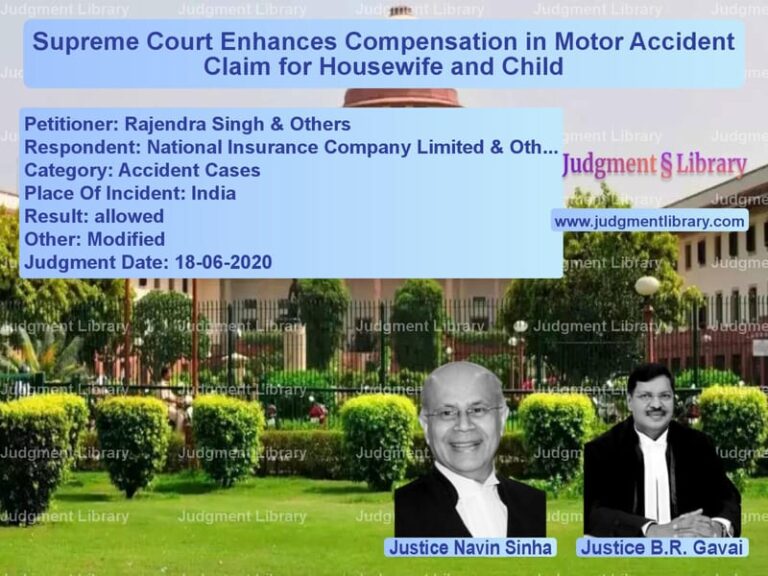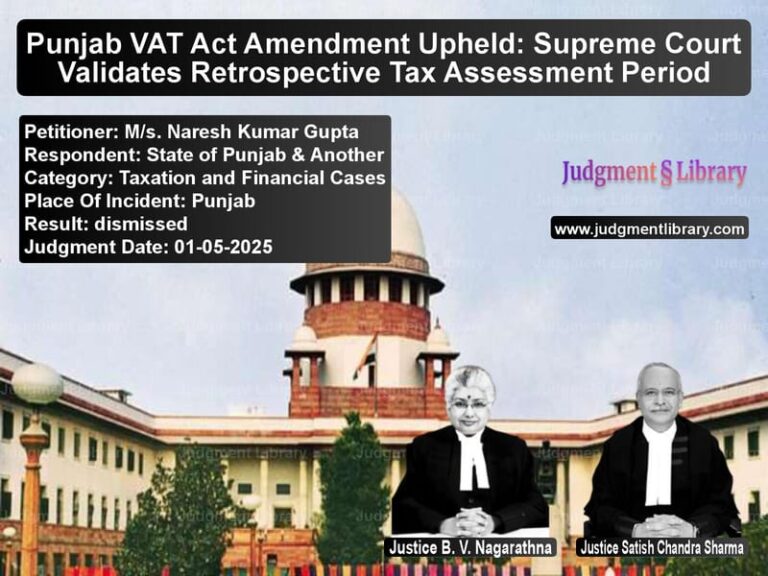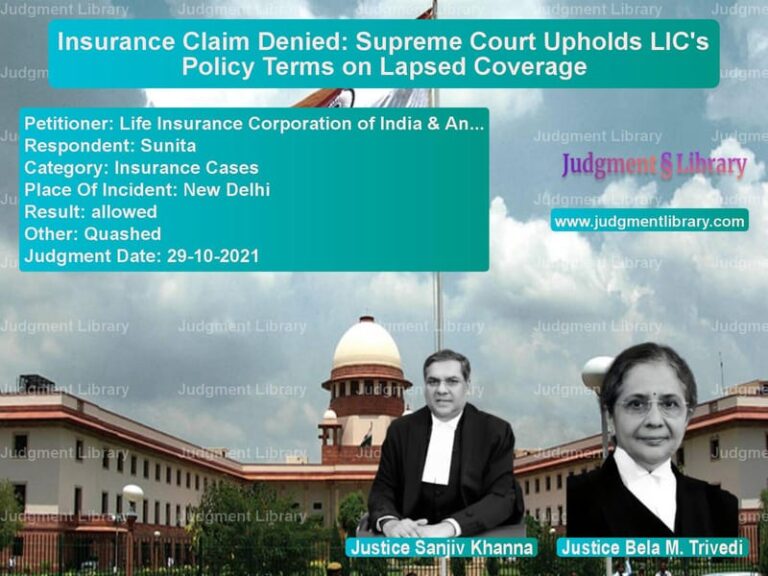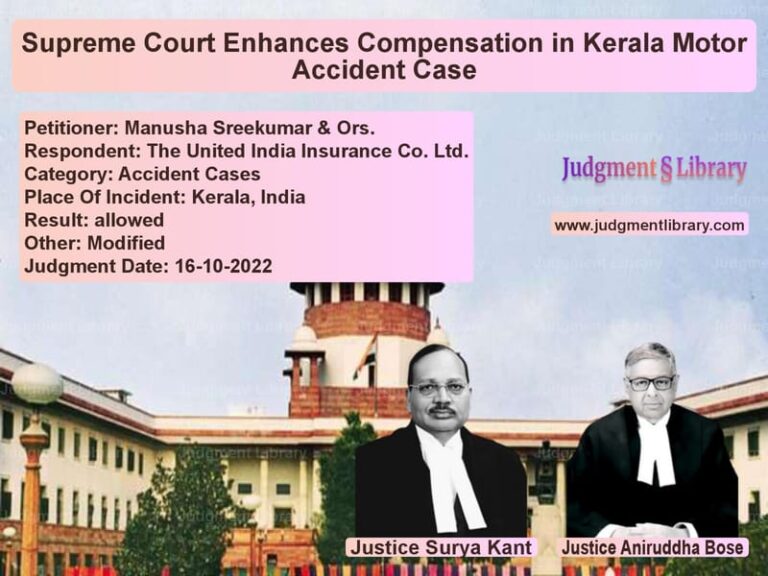Merit-Based Admission and Compensation for Medical College Admission Denial: Analysis of Maharishi Markandeshwar University v. Akriti Sharma
The case revolves around a dispute regarding the admission of a student, Akriti Sharma, to the MBBS course at Maharishi Markandeshwar Medical College and Hospital, Solan. The first respondent, Akriti Sharma, secured a higher rank in the NEET-UG 2021 examination than three other students who were initially admitted under the management quota. However, these students were later upgraded to the state quota during the mop-up round of counselling, resulting in Akriti Sharma being denied admission despite her superior merit. The High Court ruled in favor of the first respondent, and the appellants challenged the decision in the Supreme Court. This blog post delves into the legal arguments, the Supreme Court’s reasoning, and the final judgment.
Background of the Case
The case originated from the admission process for the MBBS degree course for the academic year 2021-2022 at Maharishi Markandeshwar Medical College, Solan. The first respondent, Akriti Sharma, appeared for the NEET-UG 2021 exam and secured 456 out of 720 marks, with a rank of 1,26,537. Despite her merit, she was not admitted to the MBBS course due to the upgradation of seats from the management quota to the state quota, which was contested by Akriti Sharma. The appellants, Maharishi Markandeshwar University, issued a schedule for the mop-up round of counselling, where 44 vacant seats were available for admission. During the mop-up round, the first respondent applied for admission under the state quota but was not selected, as the seats were already filled by candidates who were upgraded from the management quota.
Petitioner’s Arguments
The appellants, Maharishi Markandeshwar University, presented several arguments in their defense:
- Followed the Prospectus Guidelines: The appellants argued that the mop-up round of counselling was carried out strictly in accordance with the guidelines outlined in the prospectus. The appellants stated that the seats under the state quota were filled by upgrading candidates from the management quota, as per clause 4 of the prospectus.
- Completion of Admissions: The appellants pointed out that by the time the writ petition was filed by Akriti Sharma, all the state quota seats had been filled, and no further admissions could be made for the academic year 2021-2022.
- Issue of Vacancy: The appellants submitted that the issue of vacant seats was resolved during the mop-up round and no further admissions could be made without exceeding the prescribed intake of 150 seats for the MBBS course.
- Academic Session Already Commenced: The appellants argued that the first session of the MBBS course had already been completed, and allowing the first respondent to join at that point would disrupt the academic schedule, affecting the students who had already been admitted and had completed a portion of their studies.
Respondent’s Arguments
The first respondent, Akriti Sharma, presented counterarguments in favor of her admission:
- Merit-Based Admission: Akriti Sharma’s counsel argued that the merit-based admission system should prevail, and since she had secured higher marks in NEET-UG 2021 than the students who were upgraded from the management quota, she was entitled to admission under the state quota.
- Violation of Prospectus Guidelines: The respondent contended that the upgradation of students from the management quota to the state quota was not in accordance with the provisions of the prospectus. Clause 3 of the prospectus clearly outlined the process for mop-up round counselling, and Akriti Sharma argued that she had the right to be admitted based on her merit, not the upgradation of lower-ranked candidates.
- No Delay in Seeking Remedies: The respondent emphasized that there was no delay in seeking legal remedies. The writ petition was filed on 29th March 2022, shortly after the issue of the upgradation of seats arose. The first respondent argued that she had timely sought justice and should not be penalized for the procedural issues that occurred during the admission process.
- Rightful Admission: Akriti Sharma argued that, had the appellants followed the merit-based system as stipulated in the prospectus, she would have been admitted to the MBBS course. Therefore, the respondent contended that the denial of her admission was arbitrary and in violation of the prospectus.
The Court’s Reasoning
The Supreme Court, after considering the arguments from both sides, arrived at the following conclusions:
- Interpretation of Prospectus Clauses: The Court examined the provisions of the prospectus, particularly clauses 3 and 4, which governed the upgradation of students from the management quota to the state quota. The Court concluded that clause 3 applied to the mop-up round, where candidates could apply for vacant seats in the state quota. The Court held that Akriti Sharma, having secured higher marks, was entitled to admission under the state quota as per clause 3.
- Merit-Based Admission: The Court reiterated the importance of merit in medical college admissions, emphasizing that merit must be the primary consideration. The Court referred to previous judgments, including Asha v. Pt. B.D. Sharma University of Health Sciences, which underscored that any deviation from the merit-based system undermines fairness in the admission process.
- Wrongful Denial of Admission: The Court agreed with the High Court’s finding that Akriti Sharma had been wrongfully denied admission to the MBBS course despite her higher merit. The appellants’ action of upgrading lower-ranked students from the management quota to the state quota was found to be in violation of the guidelines set forth in the prospectus.
- Relief and Compensation: While the Court acknowledged the wrongful denial of admission, it also recognized that the academic year for 2021-2022 had already progressed significantly. The Court stated that it was not feasible to grant admission to Akriti Sharma at that stage, as it would disrupt the ongoing academic session. However, the Court directed the appellants to compensate the first respondent for the loss of one academic year. The Court quantified the compensation at Rs. 10 lakhs, to be paid within one month.
The Court’s Decision
The Supreme Court partly allowed the appeal, making the following orders:
- Compensation: The appellants were directed to pay compensation of Rs. 10 lakhs to the first respondent within one month.
- Redrawing of Merit List Set Aside: The Court set aside the High Court’s direction to redraw the merit list and grant admission to Akriti Sharma in the current academic session.
- Future Admissions: The Court emphasized that future admissions should follow the merit-based system, and no student should be deprived of their rightful admission due to procedural errors.
Conclusion
This case highlights the importance of maintaining fairness and transparency in the medical college admission process. The Court’s decision reinforces the principle that merit must be the primary criterion for admission to medical courses and that any deviation from this principle can lead to legal consequences. The compensation awarded to Akriti Sharma provides a partial remedy for the wrongful denial of her admission, but it also underscores the need for adherence to clear and fair admission procedures in the future.
Petitioner Name: Maharishi Markandeshwar University.Respondent Name: Akriti Sharma and Others.Judgment By: Justice Dr Dhananjaya Y Chandrachud, Justice Hima Kohli.Place Of Incident: Himachal Pradesh.Judgment Date: 19-09-2022.
Don’t miss out on the full details! Download the complete judgment in PDF format below and gain valuable insights instantly!
Download Judgment: maharishi-markandesh-vs-akriti-sharma-and-ot-supreme-court-of-india-judgment-dated-19-09-2022.pdf
Directly Download Judgment: Directly download this Judgment
See all petitions in Fundamental Rights
See all petitions in Constitution Interpretation
See all petitions in Public Interest Litigation
See all petitions in Separation of Powers
See all petitions in Judgment by Dhananjaya Y Chandrachud
See all petitions in Judgment by Hima Kohli
See all petitions in partially allowed
See all petitions in supreme court of India judgments September 2022
See all petitions in 2022 judgments
See all posts in Constitutional Cases Category
See all allowed petitions in Constitutional Cases Category
See all Dismissed petitions in Constitutional Cases Category
See all partially allowed petitions in Constitutional Cases Category

